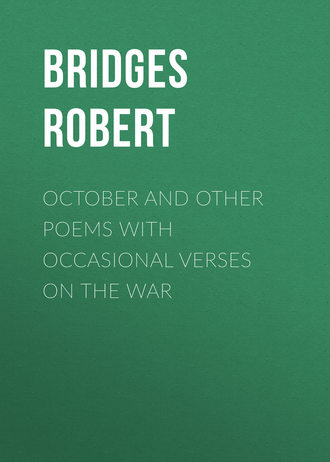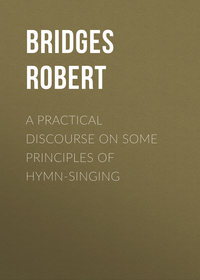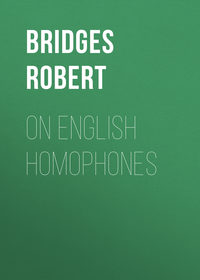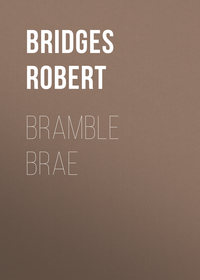 полная версия
полная версияOctober and Other Poems with Occasional Verses on the War

Robert Bridges
October and Other Poems / with Occasional Verses on the War
PREFACE
This miscellaneous volume is composed of three sections. The first twelve poems were written in 1913, and printed privately by Mr. Hornby in 1914.
The last of these poems proved to be a “war poem,” and on that follow eighteen pieces which were called forth on occasion during the War, the last being a broadsheet on the surrender of the German ships. All of these verses appeared in some journal or serial. There were a few others, but they are not included in this collection, either because they are lost, or because they show decidedly inferior claims to salvage.
The last six poems or sonnets are of various dates.
R. B.OCTOBER
April adance in playmet with his lover Maywhere she came garlanded.The blossoming boughs o’erheadwere thrill’d to bursting bythe dazzle from the skyand the wild music therethat shook the odorous air.Each moment some new birthhasten’d to deck the earthin the gay sunbeams.Between their kisses dreams:And dream and kiss were rifewith laughter of mortal life.But this late day of golden fallis still as a picture upon a wallor a poem in a book lying open unread.Or whatever else is shrinedwhen the Virgin hath vanishèd:Footsteps of eternal Mindon the path of the dead.THE FLOWERING TREE
What Fairy fann’d my dreamswhile I slept in the sun?As if a flowering treewere standing over me:Its young stem strong and lithewent branching overheadAnd willowy sprays aroundfell tasseling to the groundAll with wild blossom gayas is the cherry in MayWhen her fresh flaunt of leafgives crowns of golden green.The sunlight was enmesh’din the shifting splendourAnd I saw through on highto soft lakes of blue sky:Ne’er was mortal slumberso lapt in luxury.Rather—Endymion—would I sleep in the sunNeath the trees divinelywith day’s azure aboveWhen my love of Beautyis met by beauty’s love.So I slept enchantedunder my loving treeTill from his late restingthe sweet songster of nightRousing awaken’d me:Then! this—the birdis note—Was the voice of thy throatwhich thou gav’st me to kiss.NOEL: CHRISTMAS EVE, 1913
Pax hominibus bonæ voluntatisA frosty Christmas Evewhen the stars were shiningFared I forth alonewhere westward falls the hill,And from many a villagein the water’d valleyDistant music reach’d mepeals of bells aringing:The constellated soundsran sprinkling on earth’s floorAs the dark vault abovewith stars was spangled o’er.Then sped my thought to keepthat first Christmas of allWhen the shepherds watchingby their folds ere the dawnHeard music in the fieldsand marveling could not tellWhether it were angelsor the bright stars singing.Now blessed be the tow’rsthat crown England so fairThat stand up strong in prayerunto God for our souls:Blessed be their founders(said I) an’ our country folkWho are ringing for Christin the belfries to-nightWith arms lifted to clutchthe rattling ropes that raceInto the dark aboveand the mad romping din.But to me heard afarit was starry musicAngels’ song, comfortingas the comfort of ChristWhen he spake tenderlyto his sorrowful flock:The old words came to meby the riches of timeMellow’d and transfiguredas I stood on the hillHeark’ning in the aspectof th’ eternal silence.IN DER FREMDE
Ah! wild-hearted wand’rerfar in the world awayRestless nor knowest whyonly thou canst not stayAnd now turnest tremblinghearing the wind to sigh:’Twas thy lover callingwhom thou didst leave forby.So faint and yet so farso far and yet so fain—“Return belov’d to me”but thou must onward strain:Thy trembling is in vainas thy wand’ring shall be.What so well thou lovestthou nevermore shalt see.THE PHILOSOPHER AND HIS MISTRESS
We watch’d the wintry moonSuffer her full eclipseRiding at night’s high noonBeyond the earth’s ellipse.The conquering shadow quell’dHer splendour in its robe:And darkling we beheldA dim and lurid globe;Yet felt thereat no dread,Nor waited we to seeThe sullen dragon fled,The heav’nly Queen go free.So if my heart of painOne hour o’ershadow thine,I fear for thee no stain,Thou wilt come forth and shine:And far my sorrowing shadeWill slip to empty spaceInvisible, but madeHappier for that embrace.NARCISSUS
Almighty wondrous everlastingWhether in a cradle of astral whirlfireOr globed in a piercing star thou slumb’restThe impassive body of God:Thou deep i’ the core of earth—Almighty!—From numbing stress and gloom profoundMadest escape in life desirousTo embroider her thin-spun robe.’Twas down in a wood—they tell—In a running water thou sawest thyselfOr leaning over a pool: The sedgesWere twinn’d at the mirror’s brimThe sky was there and the trees—Almighty!—A bird of a bird and white clouds floatingAnd seeing thou knewest thine own imageTo love it beyond all else.Then wondering didst thou speakOf beauty and wisdom of art and worshipDidst build the fanes of Zeus and ApolloThe high cathedrals of Christ.All that we love is thine—Almighty!—Heart-felt music and lyric songLanguage the eager grasp of knowledgeAll that we think is thine.But whence?—Beauteous everlasting!—Whence and whither? Hast thou mistaken?Or dost forget? Look again! Thou seestA shadow and not thyself.OUR LADY
IGoddess azure-mantled and aureoledThat standing barefoot upon the moonOr throned as a Queen of the earthTranquilly smilest to holdThe Child-god in thine arms,Whence thy glory? Art not sheThe country maiden of GalileeSimple in dowerless povertyWho from humble cradle to graveHadst no thought of this wonder?When to man dull of heartDawn’d at length graciouslyThy might of MotherhoodThe starry Truth beam’d on his home;Then with insight exalted he gave theeThe trappings—Lady—wherewith his artDelighteth to picture his spirit to senseAnd that grace is immortal.Fount of creative LoveMother of the Word eternalAtoning man with God:Who set thee apart as a garden enclosedFrom Nature’s all-producing wildsTo rear the richest fruit o’ the LifeEver continuing out from HimUrgent since the beginning.IIBehold! Man setteth thine image in the height of HeavenAnd hallowing his untemper’d loveCrowneth and throneth thee ador’d(Tranquilly joyous to holdThe man-child in thine arms)God-like apart from conflict to save theeTo guard thy weak caressive beautyWith incontaminate jewels of soulCourage, patience, and self-devotion:All this glory he gave thee.Secret and slow is NatureImperceptibly movingWith surely determinate aim:To woman it fell to be early in primeReady to labour, mould, and cherishThe delicate head of all ProductionThe wistful late-maturing boyWho made Knowing of Being.Therefore art thou ador’dMother of God in manNaturing nurse of power:They who adore not thee shall perishBut thou shalt keep thy path of joyEnvied of Angels because the All-fatherCall’d thee to mother his nascent WordAnd complete the creation.THE CURFEW TOWER
Thro’ innocent eyes at the world awond’ringNothing spake to me more superblyThan the round bastion of Windsor’s wallThat warding the Castle’s southern angleAn old inheritor of Norman prowessWas call’d by the folk the Curfew Tow’r.Above the masonry’s rugged coursesA turreted clock of Caroline fashionTold time to the town in black and gold.It charmed the hearts of Henry’s scholarsAs kingly a mentor of English storyAs Homer’s poem is of Ilion:Nor e’er in the landscape look’d it fairerThan when we saw its white bulk halo’dIn a lattice of slender scaffoldings.Month by month on the airy platformsWorkmen labour’d hacking and hoistingTill again the tower was stript to the sun:The old tow’r? Nay a new tow’r stood thereFrom footing to battlemented skylineAnd topt with a cap the slice of a coneArchæologic and counterfeitedThe smoothest thing in all the high-streetAs Eton scholars to-day may see:They—wherever else they find their wonderAnd feed their boyhood on Time’s enchantment—See never the Tow’r that spoke to me.FLYCATCHERS
Sweet pretty fledgelings, perched on the rail arow,Expectantly happy, where ye can watch belowYour parents a-hunting i’ the meadow grassesAll the gay morning to feed you with flies;Ye recall me a time sixty summers ago,When, a young chubby chap, I sat just soWith others on a school-form rank’d in a row,Not less eager and hungry than you, I trow,With intelligences agape and eyes aglow,While an authoritative old wise-acreStood over us and from a desk fed us with flies.Dead flies—such as litter the library south-window,That buzzed at the panes until they fell stiff-baked on the sill,Or are roll’d up asleep i’ the blinds at sunrise,Or wafer’d flat in a shrunken folio.A dry biped he was, nurtured likewiseOn skins and skeletons, stale from top to toeWith all manner of rubbish and all manner of lies.GHOSTS
Mazing around my mind like moths at a shaded candle,In my heart like lost bats in a cave fluttering,Mock ye the charm whereby I thought reverently to lay you,When to the wall I nail’d your reticent effigys?Έτώσιον ἄχθος ἀρούρης
Who goes there? God knows. I’m nobody. How should I answer?Can’t jump over a gate nor run across the meadow.I’m but an old whitebeard of inane identity. Pass on!What’s left of me to-day will very soon be nothing.HELL AND HATE
Two demons thrust their arms out over the world,Hell with a ruddy torch of fire,And Hate with gasping mouth,Striving to seize two children fairWho play’d on the upper curve of the Earth.Their shapes were vast as the thoughts of man,But the Earth was smallAs the moon’s rim appearethScann’d through an optic glass.The younger child stood erect on the EarthAs a charioteer in a carOr a dancer with arm upraised;Her whole form—barely cladFrom feet to golden head—Leapt brightly against the uttermost azure,Whereon the stars were splashes of lightDazed in the gulfing beds of space.The elder might have been stell’d to showThe lady who led my boyish love;But her face was graver than e’er to meWhen I look’d in her eyes long ago,And the hair on her shoulders fal’nNested its luminous brownI’ the downy spring of her wings:Her figure aneath was screen’d by the Earth,Whereoff—so small that wasNo footing for her could be—She appeared to be sailing freeI’ the glide and poise of her flight.Then knew I the Angel Faith,Who was guarding human Love.Happy were both, of peaceful mien,Contented as mankind longeth to be,Not merry as children are;And show’d no fear of the Fiends’ pursuit,As ever those demons clutched in vain;And I, who had fear’d awhile to seeSuch gentleness in such jeopardy,Lost fear myself; for I saw the foesWere slipping aback and had no holdOn the round Earth that sped its course.The painted figures never could move,But the artist’s mind was there:The longer I look’d the more I knewThey were falling, falling away belowTo the darkness out of sight.December 16, 1913.“WAKE UP, ENGLAND!” 1
Thou careless, awake!Thou peacemaker, fight!Stand England for honourAnd God guard the Right!Thy mirth lay aside,Thy cavil and play;The fiend is upon theeAnd grave is the day.* * *Through fire, air and waterThy trial must be;But they that love life bestDie gladly for thee.* * *Much suffering shall cleanse theeBut thou through the floodShalt win to salvation,To beauty through blood.Up, careless, awake!Ye peacemakers, fight!Stand England for honour,And God guard the Right!August, 1914.LORD KITCHENER
Unflinching hero, watchful to foreseeAnd face thy country’s peril wheresoe’er,Directing war and peace with equal care,Till by long toil ennobled thou wert heWhom England call’d and bade “Set my arm freeTo obey my will and save my honour fair”—What day the foe presumed on her despairAnd she herself had trust in none but thee:Among Herculean deeds the miracleThat mass’d the labour of ten years in oneShall be thy monument. Thy work is doneEre we could thank thee; and the high sea-swellSurgeth unheeding where thy proud ship fellBy the lone Orkneys, at the set of sun.ODE ON THE TERCENTENARY COMMEMORATION OF SHAKESPEARE, 1916
Kind dove-wing’d Peace, for whose green olive-crownThe noblest kings would give their diadems,Mother who hast ruled our home so long,How suddenly art thou fled!Leaving our cities astir with war;And yet on the fair fields desertedLingerest, wherever the gaudy seasonsDeck with excessive splendourThe sorrow-stricken year,Where cornlands bask and high elms rustle gently,And still the unweeting birds sing on by brae and bourn.The trumpet blareth and calleth the true to be sternBe then thy soft reposeful music dumb;Yet shall thy lovers awhile give ear—Tho’ in war’s garb they come—To the praise of England’s gentlest son;Whom when she bore the Muses lov’dAbove the best of eldest honour—Yea, save one without peer—And by great Homer set,Not to impugn his undisputed throne,The myriad-hearted by the mighty-hearted one.For God of His gifts pour’d on him a full measure,And gave him to know Nature and the ways of men:To dower with inexhaustible treasureA world-conquering speech,Which surg’d as a river high-descendedThat gathering tributaries of many landsRolls through the plain a bounteous flood,Picturing towers and templesAnd ruin of bygone times,And floateth the ships deep-laden with merchandiseOut on the windy seas to traffic in foreign climes.Thee Shakespeare to-day we honour; and evermore,Since England bore thee, the master of human song,Thy folk are we, children of thee,Who knitting in one her realmAnd strengthening with pride her sea-borne clans,Scorn’st in the grave the bruize of death.All thy later-laurel’d choirLaud thee in thy world-shrine:London’s laughter is thine;One with thee is our temper in melancholy or might,And in thy book Great-Britain’s rule readeth her right.Her chains are chains of Freedom, and her bright armsHonour Justice and Truth and Love to man.Though first from a pirate ancestryShe took her home on the wave,Her gentler spirit arose disdainful,And smiting the fetters of slaveryMade the high seaways safe and free,In wisdom bidding aloudTo world-wide brotherhood,Till her flag was hail’d as the ensign of Liberty,And the boom of her guns went round the earth in salvos of peace.And thou, when Nature bow’d her mastering handTo borrow an ecstasy of man’s art from thee,Thou her poet secure as sheOf the shows of eternity,Didst never fear thy work should fallTo fashion’s craze nor pedant’s follyNor devastator whose arrogant armsMurder and maim mankind;Who when in scorn of graceHe hath batter’d and burn’d some loveliest dearest shrine,Laugheth in ire and boasteth aloud his brazen god.* * * * *I saw the Angel of Earth from strife aloofMounting the heavenly stair with Time on high,Growing ever younger in the brightening airOf the everlasting dawn:It was not terror in his eyes nor wonder,That glance of the intimate exaltationWhich lieth as Power under all Being,And broodeth in Thought above,As a bird wingeth over the ocean,Whether indolently the heavy water sleepethOr is dash’d in a million waves, chafing or lightly laughing.I hear his voice in the music of lamentation,In echoing chant and cadenced litany,In country song and pastoral pipingAnd silvery dances of mirth:And oft, as the eyes of a lion in the brake,His presence hath startled me,In austere shapes of beauty lurking,Beautiful for Beauty’s sake;As a lonely blade of lifeAriseth to flower whensoever the unseen WillStirreth with kindling aim the dark fecundity of Being.Man knoweth but as in a dream of his own desireThe thing that is good for man, and he dreameth well:But the lot of the gentle heart is hardThat is cast in an epoch of life,When evil is knotted and demons fight,Who know not, they, that the lowest lotIs treachery hate and trust in sinAnd perseverance in ill,Doom’d to oblivious Hell,To pass with the shames unspoken of men away,Wash’d out with their tombs by the grey unpitying tears of Heaven.But ye, dear Youth, who lightly in the day of furyPut on England’s glory as a common coat,And in your stature of masking graceStood forth warriors complete,No praise o’ershadoweth yours to-day,Walking out of the home of loveTo match the deeds of all the dead.—Alas! alas! fair Peace,These were thy blossoming roses.Look on thy shame, fair Peace, thy tearful shame!Turn to thine isle, fair Peace; return thou and guard it well!THE CHIVALRY OF THE SEA
DEDICATED TO THE MEMORY OF CHARLES FISHER, LATE STUDENT OF CHRIST CHURCH, OXFORD, LOST IN THE “INVINCIBLE.”Over the warring waters, beneath the wandering skies,The heart of Britain roameth, the Chivalry of the sea,Where Spring never bringeth a flower, nor bird singeth in a tree;Far, afar, O beloved, beyond the sight of our eyes,Over the warring waters, beneath the stormy skies.Staunch and valiant-hearted, to whom our toil were play,Ye man with armour’d patience the bulwarks night and day,Or on your iron coursers plough shuddering through the Bay,Or neath the deluge drive the skirmishing sharks of war:Venturous boys who leapt on the pinnace and row’d from shore,A mother’s tear in the eye, a swift farewell to say,And a great glory at heart that none can take away.Seldom is your home-coming; for aye your pennon fliesIn unrecorded exploits on the tumultuous wave;Till, in the storm of battle, fast-thundering upon the foe,Ye add your kindred names to the heroes of long-ago,And mid the blasting wrack, in the glad sudden death of the brave,Ye are gone to return no more.—Idly our tears arise;Too proud for praise as ye lie in your unvisited grave,The wide-warring water, under the starry skies.FOR “PAGES INÉDITES,” Etc
April, 1916By our dear sons’ graves, fair France, thou’rt now to us, endear’d;Since no more as of old stand th’ English against thee in fight,But rallying to defend thee they die guarding thy beautyFrom blind envious Hate and Perfidy leagued with Might.GHELUVELT
EPITAPH ON THE WORCESTERS. OCTOBER 31, 1914Askest thou of these graves? They’ll tell thee,O stranger, in EnglandHow we Worcesters lie where we redeem’d the battle.THE WEST FRONT
AN ENGLISH MOTHER, ON LOOKING INTO MASEFIELD’S “OLD FRONT LINE.”No country know I so wellas this landscape of hell.Why bring you to my painthese shadow’d effigysOf barb’d wire, riven trees,the corpse-strewn blasted plain?And the names—HebuterneBethune and La Bassée—I have nothing to learn—Contalmaison, Boisselle,And one where night and daymy heart would pray and dwell;A desert sanctuary,where in holy vigilYear-long I have held my faithagainst th’ imaginingsOf horror and agonyin an ordeal aboveThe tears of sufferingand took aid of angels:This was the temple of God:no mortuary of kingsEver gathered the spoilsof such chivalry and love:No pilgrim shrine soe’erhath assembled such prayer—With rich incense-waftedritual and requiemNot beauteous batter’d Rheimsnor lorn Jerusalem.TO THE UNITED STATES OF AMERICA
April, 1917Brothers in blood! They who this wrong beganTo wreck our commonwealth, will rue the dayWhen first they challenged freemen to the fray,And with the Briton dared the American.Now are we pledged to win the Rights of man;Labour and justice now shall have their way,And in a League of Peace—God grant we may—Transform the earth, not patch up the old plan.Sure is our hope since he, who led your nation,Spake for mankind; and ye arose in aweOf that high call to work the world’s salvation;Clearing your minds of all estranging blindnessIn the vision of Beauty, and the Spirit’s law,Freedom and Honour and sweet Loving-kindness.TRAFALGAR SQUARE
September, 1917Fool that I was: my heart was sore,Yea sick for the myriad wounded men,The maim’d in the war: I had grief for each one:And I came in the gay September sunTo the open smile of Trafalgar Square;Where many a lad with a limb fordoneLoll’d by the lion-guarded columnThat holdeth Nelson statued thereonUpright in the air.The Parliament towers and the Abbey towers,The white Horseguards and grey Whitehall,He looketh on all,Past Somerset House and the river’s bendTo the pillar’d dome of St. Paul,That slumbers confessing God’s solemn blessingOn England’s glory, to keep it ours—While children true her prowess renewAnd throng from the ends of the earth to defendFreedom and honour—till Earth shall end.The gentle unjealous Shakespeare, I trow,In his country tomb of peaceful fame,Must feel exiled from life and glowIf he think of this man with his warrior claim,Who looketh o’er London as if ’twere his own,As he standeth in stone, aloft and alone,Sailing the sky with one arm and one eye.CHRISTMAS EVE, 1917
Many happy returns, sweet Babe, of the day!Didst not thou sow good seed in the world, thy field?Cam’st thou to save the poor? Thy poor yet pine.Thousands to-day suffer death-pangs like thine;Our jewels of life are spilt on the ground as dross;Ten thousand mothers stand beneath the cross.Peace to men of goodwill was the angels’ song:Now there is fiercer war, worse filth and wrong.If thou didst sow good seed, is this the yield?Shall not thy folk be quell’d in dead dismay?Nay, with a larger hope we are fed and heal’dThan e’er was reveal’d to the saints who died so strong;For while men slept the seed had quicken’d unseen.England is as a field whereon the corn is green.Of trial and dark tribulation this vision is born—Britain as a field green with the springing corn.While we slumber’d the seed was growing unseen.Happy returns of the day, dear Babe, we say.England has buried her sins with her fathers’ bones.Thou shalt be throned on the ruin of kingly thrones.The wish of thine heart is rooted in carnal mind;For good seed didst thou sow in the world thy field:It shall ripen in gold and harvest an hundredfold.Peace shall come as a flood upon all mankind;Love shall comfort and succour the poor that are pined.Wherever our gentle children are wander’d and sped,Simple apostles thine of the world to come,They carried the living seed of the living Bread.The angel-song and the gospel of Christendom,That while the nation slept was springing unseen.So tho’ we be sorely stricken we feel no dread:Our thousand sons suffer death-pangs like thine:It shall ripen in gold and harvest an hundredfold:Peace and Love shall hallow our care and teen,Shall bind in fellowship all the folk of the earthTo kneel at thy cradle, Babe, and bless thy birth.Ring we the bells up and down in country and town,And keep the old feast unholpen of preacher or priest,Wishing thee happy returns, and thy Mother May,Ever happier and happier returns, dear Christ, of thy day!TO THE PRESIDENT OF THE UNITED STATES OF AMERICA
August, 1918See England’s stalwart daughter, who made emprise’Gainst her own mother, freeborn of the free,Who slew her sons for her slaves’ liberty,See for mankind her majesty arise!From her new world her unattainted eyesEspy deliverance, and her bold decreeSpeaks for Great Britain’s wide confederacy:The folk shall rule, if only they be wise.Ambition, hate, revenge, the secret swayOf priest and kingcraft shall be done awayBy faith in beauty, chivalry and good.One God made all, and will all wrongs forgiveSave their hell-heart who stab man’s hope to liveIn mutual freedom, peace and brotherhood.OUR PRISONERS OF WAR IN GERMANY
October, 1918Prisoners to a foe inhuman, Oh! but our hearts rebel:Defenceless victims ye are, in claws of spite a prey,Conquering your torturers, enduring night and dayMalice, year-long drawn out your noble spirits to quell.Fearsomer than death this rack they ranged, and reckon’d well’Twould harrow our homes, and plied, such devilish aim had they,That England roused to rage should wrong with wrong repay,And smirch her envied honour in deeds unspeakable.Nor trouble we just Heaven that quick revenge be doneOn Satan’s chamberlains highseated in Berlin;Their reek floats round the world on all lands ’neath the sun:Tho’ in craven Germany was no man found, not oneWith spirit enough to cry Shame!—Nay, but on such sinFollows Perdition eternal … and it has begun.HARVEST-HOME
VERSES TO THE AMERICANS ON THEIR THANKSGIVING DAY, CELEBRATED IN ENGLAND NOVEMBER 28, 1918A toast for West and EastDrink on this Thursday feastLast in November,The year when Albion’s landsAcross the sea join hands—Drink and remember!Nineteen-eighteen fulfill’dThe kindly purpose will’dBy the Ever-living,When first in hope upstay’dThe Pilgrim Fathers madeHarvest thanksgiving.And since the seed bore fruit,Which they went forth to rootIn the wildernesses,Ye now return to findThe Rose that they resignedWith their distresses.’Twas when the wide world o’er,Whatever peaceful shoreBritons inherit,Britons claim’d right of birth,And fought hell in the mirthOf Shakespeare’s spirit.Then your true heart was stirr’d,Your arm raised, and your wordWent forth, forecastingThat the great war should ceaseIn British bonds of peace,Peace everlasting.The good God bless this day,And we for ever and ayeKeep our love living,Till all men ’neath heaven’s domeSing Freedom’s Harvest-homeIn one Thanksgiving!



